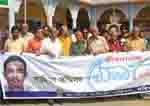 The second Sahitya Sammilon and Jibanananda Mela 2014, organised by Jatiya Kobita Parishad Barisal unit, will end today in Barishal.
The second Sahitya Sammilon and Jibanananda Mela 2014, organised by Jatiya Kobita Parishad Barisal unit, will end today in Barishal.
The three-day fair began on Friday.
Dr. Hayat Mahmud, noted academician, inaugurated the fair by paying tribute to the late poet. Shohidul Alam, deputy commissioner of Barisal, was present as the chief guest at the inaugural session. Following the inaugural ceremony, a colourful procession was taken out from Amritalal Dey College to Poet Jibanananda Memorial Hall, situated at the parental house of the poet.
The fair featured children’s painting competition, discussion sessions, recitation, cultural shows, writers’ get-together and others.
A well-attended recitation session was held where Dwijen Sharma, Nikhil Sen, Subrata Barua, Badiur Rahman, Khairul Alam Sabuj, and Dr. Kajal Bandopadhya recited some of the most famous poems of Jibanananda. This was followed by a discussion session where Aroop Talukdar, Dipankar Chakraborty, Moni Haidar and Partha Sharathi delivered speeches focusing on diverse aspects of Jibanananda’s poetry.
The speakers and participants at the programmes expressed that Das stands clearly apart from his contemporaries in the canon of 20th century Bangla literature. Popularity apart, Jibanananda had distinguished himself as an extraordinary poet presenting a paradigm hitherto unknown.
Jibanananda’s lyricism is unparalleled in Bangla literature, said the discussants. His earlier poems are vivid, eloquent celebrations of the beauty of Bengal, but became gradually darker, replete with trenchant remarks on political issues and current affairs like the Second World War, the Bengal famine of ’43 and Hindu–Muslim riots at the time of partition, the discussants observed.
While Jibanananda is best known for poetry that reveals a deep love for nature and rural landscapes, tradition and history, he is also strikingly urban, and introspective, centering on themes of loneliness, depression and death. He was a master in image-making, and although his unique poetic diction drew on tradition, it was startlingly new, the speakers emphasised.
-With New Age input




















